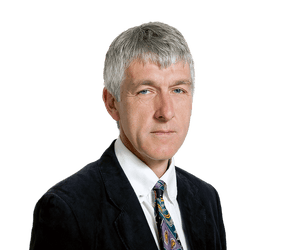Key events
IMF: Governments must wake up to risks of AI and disinformation

John Collingridge
Governments need to “wake up” to the risks of artificial intelligence and disinformation, the boss of the International Monetary Fund has warned.
Kristalina Georgieva, managing director of the IMF, said AI poses big risks to financial stability and could also stoke inequality unless regulation catches up.
With countries including the US, UK and India holding elections this year, she said the risks of disinformation are “significant and potentially very severe” and a “big driver of mistrust”.
She said:
“Artificial intelligence can lead to manipulation of data… for companies and countries in a way that we have not seen so far.
“It means that governments have to wake up and take this very seriously. At the moment I don’t think that they do.”
Georgieva, who was speaking at a breakfast organised by Bloomberg at Davos, said its research suggested 60% of jobs in advanced economies are going to be impacted by AI.
“If you are lucky [this means] enhance productivity, [your job is] more enjoyable and very likely better paid.”
There’s a buzz in the Congress centre here as Ukraine’s president Volodymyr Zelenskiy arrives for a closed-door meeting here at WEF.
Zelenskiy didn’t speak to the assembled media here, though.

Bill Gates also warned that there was a lack of preparedness for another pandemic, which required the right tools and the right institutions.
There is some money being spent and some attention paid but not nearly enough, Gates warned.

Larry Elliott
Bill Gates added that developing countries have seen their debt payments soar in recent years and were unable to borrow as much from the international financial markets. Aid spending had also fallen.
Gates told this morning’s Davos event on the future of health:
“I wish aid budgets were a lot bigger. I wish everybody was at 0.7%”(the UN target for the percentage of national income spent on aid).
Gates said his foundation was planning to spend a record $8.6b on health this year – a $2b increase – but warned that there was a risk that health in poor countries would drop down the global agenda.
Gates says:
“I would love to have a global health meeting like COP28 with 70,000 people in attendance”.
Without mentioning Donald Trump (who has won an overwhelming victory in the US’s first election contest of 2024, in Iowa) by name, Gates said he was concerned that this year’s US presidential election might lead to a reduction in America’s aid budget.
The US currently devotes 0.23% of national income to aid but Gates said:
“The US is where the election will have a consequence. You might have a reduction in that aid budget”.
Bill Gates: progress reducing child deaths in Africa has stalled

Larry Elliott
Bill Gates, the billionaire philanthropist, says the remarkable progress in reducing child deaths in Africa has stalled since 2019 because of the financial problems being faced by developing countries.
Speaking at a Davos event on the future of health, Gates called for rich countries to increase their aid spending to the UN target of 0.7% of GDP.
He said:
“From the turn of the century there was tremendous progress in reducing child deaths, which came down from 10 million a year to 5 million a year. Since 2019 the number of deaths has plateaued.”
Gates said the international community was way off course to meet the 2030 goal of reducing child deaths to 2.5m a year . The reason – developing countries were unable to invest enough in health care.
He warned:
“Progress has two components. The first is upstream research and that part is going very well. The second is the distribution part, the delivery bit – and that’s the bit at risk.”
France’s central bank chief has warned Davos that the European Central Bank cannot yet declare victory over inflation.
But… governor François Villeroy de Galhau also indicated that the ECB’s next move is likely to be a cut, some time this year.
ECB interest rates are currently a record high, while inflation ended 2023 at 2.9%.
De Galhau told a panel here in Davos:
“Barring major surprises – we look at the Middle East – our next move will be a cut, probably this year. I will not comment on the season,”
Villeroy de Galhau also cautioned that the ECB’s focus is inflation – not corporate valuations or the value of the stock markets (which boomed towards the end of last year as hopes of interest rate cuts grow).
The IMF’s Gita Gopinath has touched on this issue too….
🔴 IMF’S GOPINATH: WE’VE SEEN FINANCIAL CONDITIONS EASE EVERYWHERE.
— FinancialJuice (@financialjuice) January 16, 2024
🔴 IMF’S GOPINATH: EXUBERANCE HAS MADE THE SOFT LANDING CHALLENGE HARDER.
— FinancialJuice (@financialjuice) January 16, 2024
Full story: Geopolitical tensions and AI dominate start of World Economic Forum

Larry Elliott
Growing concern that heightened geopolitical tension could damage an already shaky global economy has dominated the start of the annual gathering of the world’s business and political elite in Davos, Switzerland.
Three potential flash points – Ukraine, the Middle East and Taiwan – threatened to overshadow the meeting of the World Economic Forum (WEF) aimed at rebuilding trust after the series of setbacks suffered in the past four years, including war, the Covid-19 pandemic and the cost of living crisis….
More here.
Chief economists see more economic uncertainty on the horizon
Anxiety over the prospects for the global economy this year is high, according to WEF’s latest poll of chief economists.
The annual survey found that global economic prospects remain fraught with uncertainty, with over half of those surveyed expecting the global economy to weaken this year.
Around three quarters expect labour market conditions to weaken this year – a blow to workers – while seven in 10 predict the pace of geoeconomic fragmentation will accelerate.
WEF adds:
-
Two-thirds said industrial policies will create new growth hotspots, but majority warns of rising fiscal strains and divergence between higher- and lower-income economies.
-
Generative AI is seen to increase productivity and innovation, with experts notably more optimistic about AI-enabled benefits for high-income economies.
Introduction: Davos begins….
Good morning from Davos, where world leaders, business chiefs, civic leaders, economists, activists and the media are gathering for the first full day of the World Economic Forum’s annual meeting.
While the temperature here in Switzerland is decidedly chilly – a bracing –12 Celsius as delegates trudge through the snow or are chauffered through traffic jams – geopolitical tensions are heating up.

Today we’ll hear from Ukraine’s president, Volodymyr Zelenskiy, as he tries to shore up support from allies as the war against Russia approaches its second anniversary.
Zelenskiy is reportedly planning to meet with JP Morgan Chase’s CEO Jamie Dimon during his visit, as he rallies economic and military support for Kiev.
According to Bloomberg, Zelenskiy “seeks to replenish the country’s coffers for its fight against Russia”.
Davos has already hosted a high-level meeting to discuss peace in Ukraine, but these talks – which don’t involve Russia – ended without a significant resolution.
Ursula von der Leyen will also address delegates today, as will China’s premier, Li Qiang.
Qiang is leading a large government delegation to this year’s World Economic Forum. Yesterday Qiang met with Swiss President Viola Amherd, with the pair signing a joint declaration to deepen bilateral ties and bolster an existing free trade agreement.
The Middle East crisis is also a growing concern for leaders here in Davos, with UK foreign secretary David Cameron warning last weekend that the ‘lights are absolutely flashing red’ on the global dashboard. He’s also visiting Davos this week.
President Joe Biden’s national security adviser, Jake Sullivan, gives a speech later in the day.
Karen Harris, partner at Bain & Company, says the the “critical macro question for discussion at Davos” is whether the last four years will be remembered as a period of great disruption, or the start of a great divergence.
Harris explains:
“If disruption is the correct lens for interpreting our recent history, then 2024 and beyond will transition to a level of blandness compared to the last few years, which will be a relief for leaders and markets. Rebuilding and re-normalization will be prevailing themes of this scenario.
“But suppose 2020-2023 was not a disruption, but rather the moment of a historical divergence—a branching point when the larger arc of mega themes and trends took a steep turn. If this lens (divergence) turns out to be correct, then the loop of volatile events triggering volatile reactions resumes in 2024; the shaking of the world resumes and likely continues even beyond this year.
The agenda
-
8.15am CET / 7.15am GMT: A panel discussion on high interest rates, including Gita Gopinath, First Deputy Managing Director of the IMF, and François Villeroy de Galhau,governor of the Central Bank of France.
-
8.15am CET / 7.15am GMT: A panel discussion on whether generative AI is the Steam Engine of the Fourth Industrial Revolution?
-
9.45am CET / 8.45am GMT: A Conversation with Sheikh Mohammed bin Abdulrahman Al-Thani, Prime Minister and Minister of Foreign Affairs of Qatar
-
10.50am CET / 9.50am CET: Special Address by Li Qiang, Premier of the People’s Republic of China
-
11.20am CET / 10.20am GMT: Special Address by Ursula von der Leyen, President of the European Commission
-
1pm CET / Noon GMT: Securing an Insecure World, including Jens Stoltenberg, secretary-general of NATO
-
2.15pm CET / 1.15pm GMT: Special address by Volodymyr Zelenskiy, President of Ukraine
-
4.30pm CET / 3.30pm GMT: A Conversation with Microsoft SEO Satya Nadella and Klaus Schwab, founder of WEF
-
5pm CET / 4pm GMT: Special address by Jake Sullivan, US National Security Advisor
-
5.30pm CET / 4.30pm GMT: A Conversation with Bisher Hani Al Khasawneh, prime minister of the Hashemite Kingdom of Jordan
-
5.30pm CET / 4.30pm GMT: A panel discussion on Industrial Policy 2.0, including Jonathan Reynolds, Shadow Secretary of State for Business and Trade.
-
6.45pm CET / 5.45pm GMT: Chief Economists Briefing,







